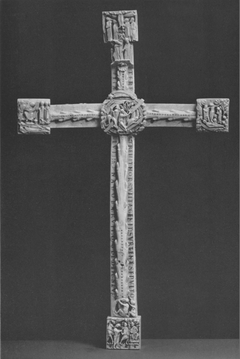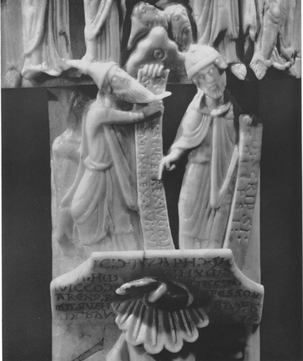John 19:21-22 - So the chief priests of the Jews said to Pilate, "Do not write, 'The King of the Jews,' but rather, 'This man said, I am King of the Jews.'" Pilate answered, "What I have written I have written."
While I know that I've read the entire Bible, I don't ever recall having read this passage. Matthew, Mark, and Luke certainly don't go into this much detail about the inscription above Jesus' head, so why does John? I wonder if Pilate had a reason for refusing to edit his inscription, or if he was just tired of dealing with the demanding Jews.
While I know that I've read the entire Bible, I don't ever recall having read this passage. Matthew, Mark, and Luke certainly don't go into this much detail about the inscription above Jesus' head, so why does John? I wonder if Pilate had a reason for refusing to edit his inscription, or if he was just tired of dealing with the demanding Jews.
One source says that the reason Pilate kept the original inscription may have been to emphasize Rome's supremacy in crucifying a Jewish king; it is likely, though, that Pilate was quite irritated by the fact that the Jewish leaders had used him as a marionette and thus compelled him to sentence Jesus to death contrary to his own will. Both possibilities make sense because at the time of Jesus' death, the Romans ruled Israel, and any threat to the Roman rule, such as Jesus' claim to be the King of the Jews, would be thwarted. Pilate may have wanted to confirm the Romans' superiority in power, authority, and status. Also, it's not unfair to say that Pilate probably felt like a puppet after the Jews practically forced him to crucify an innocent man. However, could there be additional reasons for his refusal?
As readers can notice, Pilate is hesitant to crucify Jesus without some strong justification. At the time of Pilate's governance, there was a Roman treaty with the Jews that allowed the Jews self-government. When the Jews complained that Jesus was interfering with that self-rule by claiming a supposed illegitimate title, Pilate challenged him to deny that he was the "King of the Jews." When Jesus did not deny this claim, some sources believe that at that moment, Pilate personally was convinced that Jesus was the Jewish Messiah. Being convinced that Jesus was indeed a king, Pilate could then see Christ as a threat to the Romans' rule and could have strong justification for allowing him to be crucified. He would also be justified in rejecting the suggestion to change the inscription.
Lastly, one source believes that the inscription was destined say what it did to add to the prediction in John 12:32 (And I, when I am lifted up from the earth, will draw all people to myself). It's ironic that Jesus, rejected as King and Messiah by his own people, the Jews, was proclaimed to all the world as King by Pilate, a Gentile. With that in mind, once Jesus was "lifted up from the earth," or crucified, he did, in fact, draw all people to himself. Because Pilate refused to change the wording, Christ was proclaimed by both the Jews and Gentiles to be the King.
As readers can notice, Pilate is hesitant to crucify Jesus without some strong justification. At the time of Pilate's governance, there was a Roman treaty with the Jews that allowed the Jews self-government. When the Jews complained that Jesus was interfering with that self-rule by claiming a supposed illegitimate title, Pilate challenged him to deny that he was the "King of the Jews." When Jesus did not deny this claim, some sources believe that at that moment, Pilate personally was convinced that Jesus was the Jewish Messiah. Being convinced that Jesus was indeed a king, Pilate could then see Christ as a threat to the Romans' rule and could have strong justification for allowing him to be crucified. He would also be justified in rejecting the suggestion to change the inscription.
Lastly, one source believes that the inscription was destined say what it did to add to the prediction in John 12:32 (And I, when I am lifted up from the earth, will draw all people to myself). It's ironic that Jesus, rejected as King and Messiah by his own people, the Jews, was proclaimed to all the world as King by Pilate, a Gentile. With that in mind, once Jesus was "lifted up from the earth," or crucified, he did, in fact, draw all people to himself. Because Pilate refused to change the wording, Christ was proclaimed by both the Jews and Gentiles to be the King.
Ultimately, I think that Pilate's refusal to edit the inscription is mainly because he was tired of dealing with the fussy Jews. However, I'm very intrigued by the idea that Pilate was convinced that Jesus really was the Messiah, and I don't doubt that it may have been true and that it was part of the reason he vetoed the suggested inscription.


 RSS Feed
RSS Feed